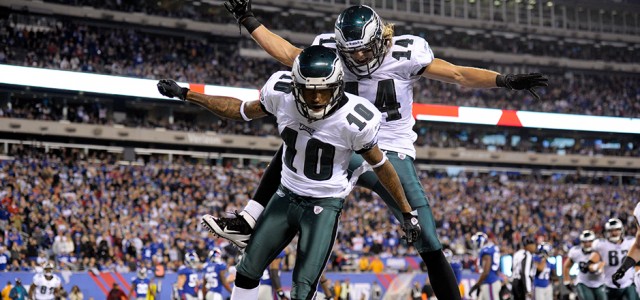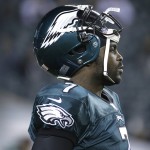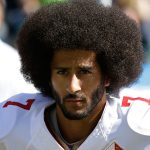LIKE MANY BLACK FANS, I saw a hint of racial bias when DeSean Jackson was released by the Philadelphia Eagles following allegations of gang affiliation.
Why? Because when Jackson’s case is compared to that of Riley Cooper, a white player who hatefully looked into a video camera at a country music concert and said, “I will fight every nigger in here,” it’s easy to see a double standard. We all saw what Riley Cooper did. He could not deny it, sugarcoat it, or explain it. His words, and the vitriol with which they were spoken, were there for everyone to see. Yet the Eagles allowed Cooper to issue an apology, leave camp for a few days, pay a fine, and return to the team. Less than a year later, they rewarded him with a 5-year, $25 million contract that far outpaces his on-the-field value.
Assumptions preceded DeSean Jackson release
DeSean Jackson, on the other hand, is accused of associating with members of the Crips, a gang that started in his native California. As in Cooper’s case, this is not a new accusation. But unlike in Cooper’s case, the accusations against Jackson are built on assumptions and innuendo rather than solid evidence.
“Unlike in Riley Cooper’s case, the accusations against Jackson are built on assumptions and innuendo rather than solid evidence.”
According to NJ.com, Jackson took pictures with Theron Shakir, a man who had been accused (and acquitted) of murder in a gang related shooting in California. Jackson posted those pictures on his Instagram account. Shakir performed on Jackson’s rap label, Jaccpot Records. Law enforcement officials say the spelling of Jackson’s label could indicate some affiliation with the Crips, as does his use of an alleged gang sign in several pictures.Jackson signed a five-year, $48.5 million contract extension in 2012, and was due more than $10 million this year. Now he won’t see that money, at least not from the Philadelphia Eagles.
I don’t know if Jackson is affiliated with the Crips gang, but I do know he raised money to fight pancreatic cancer. I don’t know if he’s ever been a gang-banger, but I do know he’s stood up publicly for bullied children. I don’t know if he’s a stellar man, but I do know he’s trying. Yet when his team could have sent him to counseling like they reportedly did with Cooper, fined him like they did with Cooper, or given him the benefit of the doubt like they did with Cooper, the Eagles not only released him. They allowed the gang stories, which were filled with conjecture and innuendo, to fester, and never said a word in Jackson’s defense.
Jackson, however, spoke in his own defense after his release was announced, and here is what he said.
DeSean Jackson speaks for himself
“First I would like to thank the Eagles organization … Secondly, I would like to address the misleading and unfounded reports that my release has anything to do with any affiliation that has been speculated surrounding the company I keep off of the field. I would like to make it very clear that I am not and never have been part of any gang. I am not a gang member and to speculate and assume that I am involved in such activity off the field is reckless and irresponsible. I work very hard on and off the field and I am a good person with good values. I am proud of the accomplishments that I have made both on and off the field. I have worked tirelessly to give back to my community and have a positive impact on those in need. It is unfortunate that I now have to defend myself and my intentions. These reports are irresponsible and just not true. I look forward to working hard for my new team. God Bless.”
To be sure, we’ll learn more about the story that broke on NJ.com in the days to come. But as a black man who spent his teen years in a North Philadelphia community much like the California neighborhood where Jackson grew up, I can tell you this. Those of us from poor communities know people who are both perpetrators and victims of violent crime. We just do. That’s reality.
Is it a mistake to remain close to reputed criminals? Yes. Can their reputations rub off on us? Yes. Do we need to change our affiliations once we move on to a different life? Yes. Jackson made a mistake in remaining affiliated with people like Theron Shakir, and it appears that he ultimately paid the price for doing so.
Still, when I look at Jackson’s case as compared to that of Riley Cooper, I see one man facing circumstantial evidence and another who committed an offense. I see one man who actually worked in the community and another who did not. I see one man who performed at an All Pro level and another who did not. I see one man who is black and another who is not.
I hope DeSean Jackson was not treated differently because he is black. But I can’t help wondering if that’s the case. ![]()
Update: Click here to see Solomon’s video commentary on the 3-year, $24 million contract DeSean Jackson signed with the Washington Redskins, with $16 million guaranteed, just four days after his release from the Philadelphia Eagles.
Featured photo: Philadelphia Eagles wide receivers DeSean Jackson (10) and Riley Cooper (14) celebrate Cooper’s 8 yard touchdown reception against the New York Giants on Sunday November 20, 2011. (AP Photo / Jim Mahoney)
 Solomon Jones is an Essence bestselling author and award-winning columnist. He is the creator and editor of Solomonjones.com Click here to learn more about Solomon
Solomon Jones is an Essence bestselling author and award-winning columnist. He is the creator and editor of Solomonjones.com Click here to learn more about Solomon








